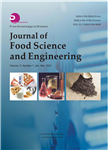Effect of Cooking Methods on the Chemical Compounds Associated with Umami Taste in Duck Breast Meat
作者机构:College of Food Science and TechnologyHuazhong Agricultural UniversityWuhan 430070HubeiChina Department of Family and Consumer SciencesNorth Carolina A&T State UniversityNorth CarolinaGreensboro 27411United States
出 版 物:《Journal of Food Science and Engineering》 (食品科学与工程(英文版)(美国))
年 卷 期:2018年第8卷第2期
页 面:65-73页
学科分类:08[工学] 0822[工学-轻工技术与工程]
主 题:Duck breast meat free amino acids oligopeptides nucleotides inosine monophosphate
摘 要:Dry-curing,wet-curing,stewing and marinating are sequential Chinese traditional meat-processing methods dating back thousands of years ***,little information is available about the contribution of each processing stage to the umami taste in duck breast ***,effects of those meat-processing methods on umami taste related chemical compounds were determined in this ***-curing significantly increased free amino acids,oligopeptides and nucleotides and nucleotides degradation products(P0.05),however,in the following wet-curing,stewing and marinating stages,the percentages of inosine and hypoxanthine were gradually *** tongue and principle component analysis results revealed the difference between dry-cured/wet-cured duck breast meat and marinated/stewed duck breast meat was due to the increase of free amino acids,oligopeptides and inosine ***,dry-curing is an important stage in meat processing,not only it produces a pool of taste related compounds,it also stimulates the enzyme activities in the ***,in the stewing stage,the umami taste profile of duck breast meat was gradually *** can conclude that dry-curing and stewing are the two crucial stages to form the umami taste profile in duck breast meat.



